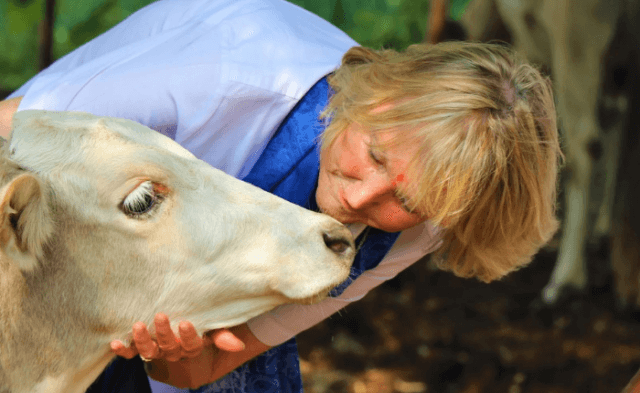Since PETA was founded, liberating animals from laboratories has been a core part of our mission—and we’ve taken on government agencies around the world to achieve it.
Tackling Taxpayer-Funded Torment
- Two laboratories in Colombia—which were funded by the U.S. National Institutes of Health (NIH) to the tune of $17 million in taxpayer funds—were ordered to cease all experiments and shut down. Their funding was canceled after a PETA investigation revealed heinous abuse there, including monkeys forced to live amid their own waste in rusty cages and left to die from untreated wounds. In the largest animal rescue in Colombia’s history, 108 monkeys and 180 mice were rescued from these hellholes. Legislation was introduced in the U.S. that would prohibit funding experiments on animals in other countries.
- Following an intensive yearlong PETA campaign, NIH ended maternal deprivation and psychological experiments in which newborn monkeys were torn away from their mothers, terrorized with loud sounds and fake snakes, addicted to alcohol, and kept alone in tiny cages. The laboratory was closed, and the lead experimenter is no longer permitted to be involved in any experiments on animals.

Ending the Military’s War on Animals
- Following PETA’s campaign, the U.S. Army pulled the plug on a brain damage experiment on ferrets at Wayne State University in which these sensitive animals were bombarded with radio waves to induce brain injuries in a purported attempt to study whether a directed energy weapon could induce Havana syndrome effects in humans.
- No animals have been used since 2020 in the U.S. Marine Corps’ Cobra Gold training in Thailand following PETA’s complaints to the U.S. Department of Defense (DOD) and protests outside the Pentagon, the Royal Thai Embassy, and the home of the secretary of defense, among other actions. Previously, Marines and their instructors killed chickens with their bare hands, skinned and ate live geckos, consumed live scorpions and tarantulas, and decapitated cobras and drank their blood.
- The U.S. Navy abruptly stopped funding a gruesome decompression sickness experiment on sheep at the University of Wisconsin–Madison following PETA’s letter to the secretary of the Navy. As a result, sheep will be spared the agony of cardiovascular collapse, spinal cord injury, and paralysis.
- President Donald Trump signed the bipartisan John S. McCain National Defense Authorization Act, which requires the DOD to use medical-simulation technology in trauma-skills training “to the maximum extent practicable” before resorting to harming animals. This law came after PETA and Homeland creator Gideon Raff briefed Congress on animal-free trauma training methods.
- After years of pressure from PETA and U.S. Rep. Lucille Roybal-Allard (D-Calif.), the U.S. Coast Guard (USCG) became the first branch of the armed forces to end the use of animals in trauma training drills. The decision followed PETA’s release of a video showing USCG instructors cutting off semiconscious goats’ legs with tree trimmers, stabbing the animals with scalpels, and pulling out their internal organs as they moaned and kicked.
- Deployment Medicine International, at one time the self-proclaimed “single largest trainer of US military forces in operational medicine,” was barred from receiving any federal contracts for 15 years, and its top trainer’s medical license was revoked after PETA documented that live pigs were mutilated and service members were abused during trauma training courses.
- Following years of campaigning by PETA—including input from military and civilian medical experts—the DOD determined that “suitable simulation alternatives can replace the use of live animals” in six major medical educational areas, including for certain trauma training courses and infant and pediatric life-support skills. The agency ordered the switch to simulation-based training across all branches of the armed forces.
- Concerted efforts by PETA entities have achieved worldwide trauma- and forensics-training victories, including the following:
- The Royal Australasian College of Surgeons ended its use of animals for its Early
Management of Severe Trauma training.
- The Norwegian government rejected a military application to shoot, stab, and break the
bones of live pigs in crude medical training exercises.
- New Zealand will no longer use live pigs for barbaric forensics experiments in which
they were repeatedly shot at close range in order to examine the resulting blood-stain patterns.

Lobbying for Lifesaving Legislation
- PETA scientists created the groundbreaking Research Modernization Deal—a strategy for replacing cruel, ineffective experiments on animals with human-relevant methods—and presented the plan to NIH and Congress.
- After reviewing the Research Modernization Deal, the European Parliament voted to direct the European Commission to develop a plan to phase out all experimentation on animals.
- President Joe Biden signed the FDA Modernization Act 2.0 into law, signaling a critical shift in the way drugs and treatments are developed and mirroring the recommendations of PETA’s Research Modernization Deal. The act removes the mandate for animal tests for new drugs and allows the U.S. Food and Drug Administration to consider superior, non-animal drug testing methods.
There have been several victories this year for animals in laboratories, but we aren’t done working. Take action for animals by encouraging your legislators to pass the CARGO Act.





